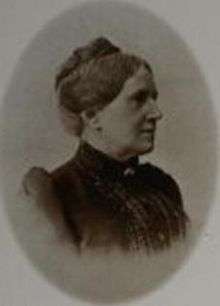Henriette Schrader-Breymann

Henriette Schrader-Breymann (1827–1899) was a German woman who was influential in early childhood education.[1][2] Her mother was a cousin of Friedrich Fröbel, and she herself was a student of his.[2] In 1870 she coined the concept of "intellectual motherhood" to express that motherhood did not have to mean physically having children.[3][4] She married Karl Schrader, a politician, in 1871.[5] In 1882 she established the Pestalozzi-Fröbel Haus, where she trained the first Swedish kindergarten teachers.[2][6] The Pestalozzi-Fröbel Haus was one of the first institutions in Germany which started to train early childhood teachers, as well as one of the first where women could get a professional training in Berlin.[2]
She emphasized "learning by doing", the kindergarten value of play, using nature as a theme and normal domestic tasks.[7]
References
- ↑ Henry Geitz; Jürgen Heideking; Jurgen Herbst; German Historical Institute (Washington, D.C.) (31 March 1995). German Influences on Education in the United States to 1917. Cambridge University Press. pp. 95–. ISBN 978-0-521-47083-4.
- 1 2 3 4 "Henriette Schrader-Breymann".
- ↑ Gisela Bock; Patricia Thane (12 November 2012). Maternity and Gender Policies: Women and the Rise of the European Welfare States, 18802-1950s. Routledge. pp. 222–. ISBN 978-1-135-08167-6.
- ↑ Johanna Einarsdottir; Judith T. Wagner (2006). Nordic Childhoods and Early Education: Philosophy, Research, Policy, and Practice in Denmark, Finland, Iceland, Norway, and Sweden. IAP. pp. 44–. ISBN 978-1-59311-351-3.
- ↑ Barbara Beatty (1 September 1997). Preschool Education in America: The Culture of Young Children from the Colonial Era to the Present. Yale University Press. pp. 50–. ISBN 978-0-300-07273-0.
- ↑ Andrew Lees; Lynn Hollen Lees (13 December 2007). Cities and the Making of Modern Europe, 1750-1914. Cambridge University Press. pp. 177–. ISBN 978-0-521-83936-5.
- ↑ Pam Hirsch; Mary Hilton (30 July 2014). Practical Visionaries: Women, Education and Social Progress, 1790-1930. Routledge. pp. 187–. ISBN 978-1-317-87722-6.